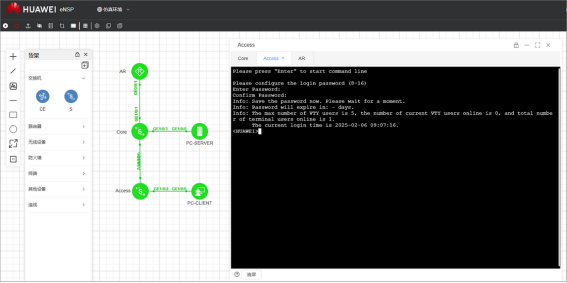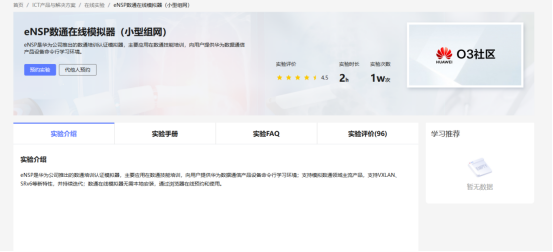Good evening, my friends!
"Teacher, ENSP is reporting errors again! I can't take it anymore!!!"
"Is this simulator sufficient for running HCIE experiments?"
"Can we use eNSP Pro instead?"
——Recently, many students have been asking me these questions.
I completely understand everyone's concerns about simulators. After all, most of you haven't had the chance to work
with eNSP Pro before. It's perfectly normal not to be familiar with it!
Today, let's dive into Huawei's next-generation simulator, eNSP Pro. We will cover everything from device support to
installation tips, addressing all your questions and solving all your doubts in one go!

Today's Article Reading Benefit: "Latest Installation Environment for eNSP Pro"
Send a private message with the code "eNSP Pro" to receive this installation environment and enhance your technical skills.

Core Features of eNSP Pro: Finally, You Can Conduct These Experiments
1.Major Protocol Support Upgrade
Essential for Hardcore Players: Full support for SRv6, EVPN, and VXLAN, making SDN networking more practical and less theoretical.
Temporary Limitation: Stack/M-LAG is still under development
2.True-to-Life Simulation Experience
Higher Startup Success Rate:50% higher than the old eNSP, with a 70% reduction in device lag.
Support for Breakpoint Saving:No need to worry about losing progress halfway through an experiment.
3.Comprehensive Device Suite
Full Range of Devices: From NE routers to USG firewalls, all series are built-in. CE switch images are available without needing to download
4.Deployment Methods:
Cloud Version of eNSP Pro (eNSP Data Communication Online Simulator): No deployment required. Huawei channel partners can log into the O3 community, navigate to "Knowledge Applications > Online Training > Online Labs," click on "Online Simulator," select the desired eNSP Pro online simulator, make a reservation, and start experimenting after confirmation.
Standalone Version of eNSP Pro: Requires local deployment. Download the eNSP Pro VM image from the enterprise technical support website and deploy it on a local Windows or Linux system.

Old eNSP: What Happened?
| Competency items | Old ENSP | eNSP Pro |
| Protocol support | Basic Configuration of OSPF/BGP | SRv6/EVPN Full Process Experiment |
| Equipment startup | Daily error report 40/41 | The virtualization architecture is more stable. |
| Experiment complexity | Supports Small to Medium-Sized Topologies | Supports Medium to Large-Sized Topologies |
| Hardware requirements | 8GB RAM | Recommended 16GB RAM |
Basic Usage Guide: Avoiding Pitfalls is More Important Than Operations
Step 1: Install the Mystical Trio
Turn off Windows Sandbox/Hyper-V
Extract image files using an all-English path
VirtualBox version must match
Step 2: Unwritten Rules for Device Startup
For Low-End Computers: Start each device one by one with a 30-second interval between each to avoid resource contention
For High-End Machines: You can start 3-5 devices simultaneously
Step 3: Secrets to Saving Experiments
Before exiting, always click on [Export Configuration]. For important experiments, it's recommended to save two copies
Precautions: Avoid These Pitfalls at All Costs!
Permission Red Lines:
Personal Accounts Won't Work: Using personal accounts will not be possible.Proxy Installation Services from Taobao May Lead to:
Loss of experimental data.
Your computer's fan turning into a helicopter engine (indicating excessive noise and heat).
Hardware Advice:
For Laptop Users: Use an external cooler and set your air conditioner to 18°C.
When Running CE Clusters:Close WeChat/Browsers.If memory usage exceeds 80%, the system may freeze.
Functionality Warnings:
Current Version Does Not Support Hot Patch Upgrades.
Cross-Version Experiment Topologies May Be Incompatible.
Friendly Reminder

Want to Use eNSP Pro? Pass These Three Checks First, or Face the Consequences:
1.Company Certification: Your company must be a Huawei CPS/ASP partner
2.Account Binding: Personal accounts need to be linked and verified with the company.
3.Hardware Requirements: 16GB of RAM is the minimum requirement; users with lightweight laptops should consider themselves warned.
Now, let's test you seasoned professionals — when you encounter error code 40, VirtualBox crashes, and your computer is hot enough to fry an egg, what’s your first reaction?
A. Smash the keyboard and switch careers to food delivery.
B. Reboot devoutly, chanting "Huawei bless me" three times.
C. Open CSDN and frantically search for "ENSP from beginner to giving up".
Feel free to share your answers in the comments!
No matter how many times technology beats us down, we still treat our experiments like first loves. Follow for more updates and stay tuned for tomorrow’s new survival tips for network engineers!


